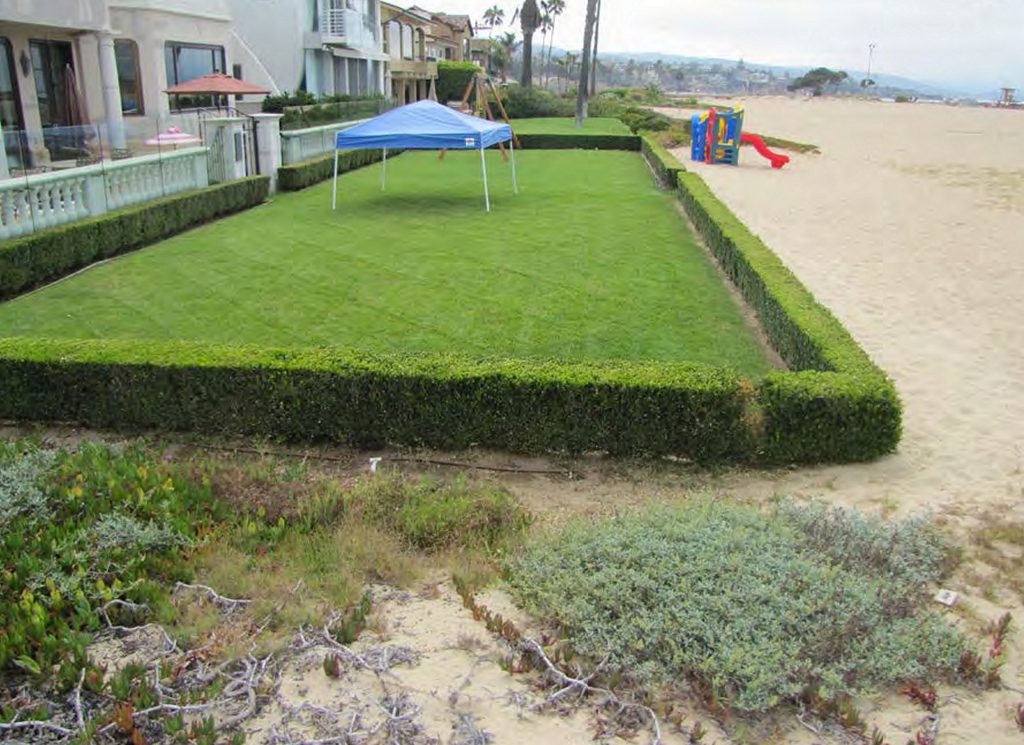
— Photo courtesy CCC
A state agency this week unanimously denied Newport Beach’s request to allow Peninsula Point property owners to keep — but scale back — their private encroachment onto public beach.
California Coastal Commission voted 11-0 Wednesday to decline the city’s proposal to amend both the Land Use Plan and the Local Implementation Plan portion of the certified Local Coastal Program to expand the allowable residential beach encroachments zone on the Balboa Peninsula, between 1400 E. Oceanfront to Channel Road, to a maximum of 15 feet seaward from oceanfront property lines.
Many homes in the area already have lawns and landscaping extending beyond their private property lines. Existing encroachments include private landscaping elements like shrubbery, groundcover, irrigated lawns, pathways, and patio furniture.
The length of the current encroachment varies among approximately 55 properties, some only about five to 10 feet, others 60 to 80 feet out onto the sand.
Total, about 1.6 acres of public beach is occupied by unpermitted residential development.
Coastal commissioners seemed to agree that the request was an attempt at privatization of public property.
Commissioner Linda Escalante thought the encroachment was “outrageous.”
“I’m quite actually flabbergasted by the audacity of some of this encroachment,” Escalante said. “It’s practically like building an oasis on public property or squatting by the rich.”
Newport Beach’s proposed amendment would have allowed property owners to construct concrete patios and decks, build 36-inch perimeter walls, and install landscaping.
City staff also suggested that property owners pay an annual fee to the city, which would be used for public beach access benefits, like parking, restrooms, walkways, and possibly “transportation alternatives.”
Newport Beach Deputy Community Development Director Jim Campbell said they are “disappointed” in the CCC staff’s recommendation. The Coastal Commission report didn’t emphasize that the city’s proposal would generate revenue, he noted.
There are already existing revenue streams to support those public access projects, noted CCC South Coast Orange County District Director Karl Schwing.
Although the city estimated their proposal would bring in about $300,000 every year, Schwing said he’s not sure where that number comes from. Considering the fee being used in the existing western peninsula encroachment program (about $1,100 per property, per year), the 55 properties on the eastern side would calculate out to about $60,000 per year, Schwing pointed out.
The potential public benefit from the revenue created by the collected fees would not be worth giving up public access, said Commissioner Donne Brownsey. Every inch of that beach is precious and should be reclaimed for public use, she added.
“What little public good (that) would occur is minimal to the windfall that these private property owners would experience by gaining this public land for their private use,” Brownsey said.
It’s all about public access, she noted, and this request is “profoundly” out of compliance with the Coastal Act.
Don Schmitz also argued on behalf of city, saying Newport Beach has been a strong partner to the Commission.
They want to follow the template that is currently used on the western portion of the peninsula, which the CCC found was consistent with the Coastal Act and approved in 1991, he noted. There have been a number of street end improvements on the west end, he continued, it’s been a very successful program.
“(It) was crafted to reflect what has already been in place for a number of years,” Schmitz said. “We think it would be a great idea to do the same thing on the eastern side of the peninsula.”
Schmitz, the city’s Coastal Commission consultant, also confirmed that they would submit a Coastal Development Permit application within 60 days to restore the beach.
The city is committed to clearing up any violations of the Coastal Act, Campbell added.
Ultimately, the current lineup on the Commission decided that any encroachment onto public beach is not acceptable.
Steve Ray of the Banning Ranch Conservancy sarcastically presented an “award for the most gall exhibited by a city in proposing the most ridiculous LCP amendment.”
It’s actually a “request for forgiveness” for multiple, ongoing violations of the Coastal Act, he added.
“This is just unconscionable,” Ray concluded.




